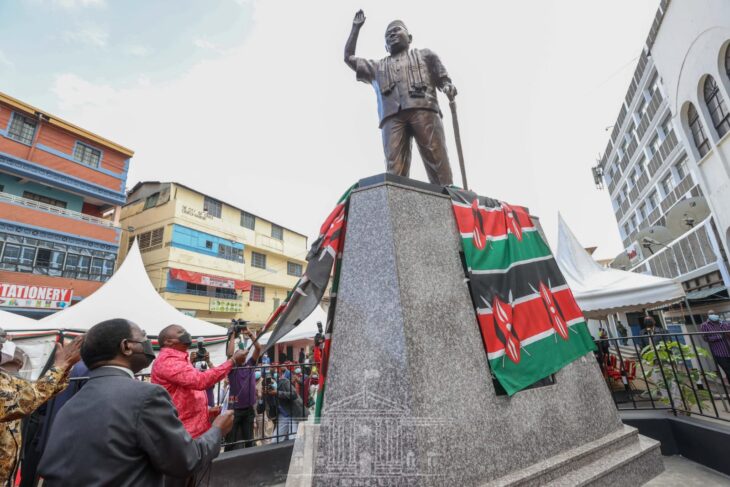NAIROBI,Kenya, Dec, 11 – President Uhuru Kenyatta on Saturday morning unveiled the statue of Kenyan independence hero, pan-Africanist and former Cabinet Minister, the late Ronald Gideon Ngala on Ronald Ngala Street in downtown Nairobi City.
The Head of State was accompanied by Sports CS Amina Mohamed and Head of Public Service Dr Joseph Kinyua among other senior Government officials to unveil the bronze statue to commemorate his life achievement.
“The monument has been put up in his honour; to celebrate him as a Nationalist and Hero. In particular, for his outstanding contribution to the Kenya’s Independence, development of Kenya’s first Constitution, his sterling service to the Nation; Kenya and his Vision for ‘Majimboism’ The founding principle of the Devolution in Kenya. His clarion call; ‘Jeza Zhomu, Lenga Dzulu’ which translates to Try Hard, Aim High will forever inspire the Great Nation of Kenya,” read a citation on the significance of the monument.
Also present was the family of the late political supremo, celebrated for ‘majimboism’, a precursor of modern-day devolution, led by his son and former long-serving Cabinet Minister, Hon Noah Katana Ngala.
Speaking at the unveiling, the President said the Government will continue honoring Kenya’s heroes and heroines for their role in the making of the Kenyan nation and for laying a solid foundation for the country’s progress.
“Following the enactment of the Heroes Act, we are now able to ensure that all our heroes and heroines are remembered and celebrated by current and future generations,” President Kenyatta said.
The statue which has since been gazetted as a national monument was commissioned to be sculpted two years ago.
The ministry of sports,culture and heritage revealed that the committee tasked with setting it up had initially been torn between erecting the monument in Nairobi and Mombasa. They finally settled on Nairobi.
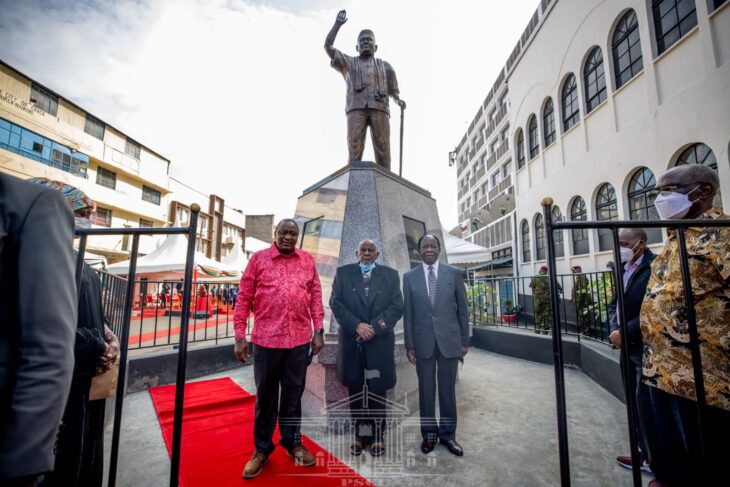
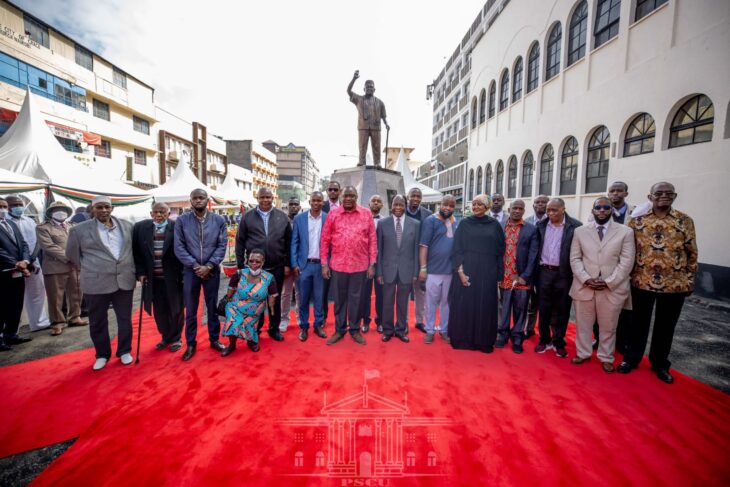
Ronald Ngala’s Early Life
Ngala was born in 1922 at Gotani area before his family later moved to Vishakani near, Kaloleni in present day Kilifi county in 1929.
In 1932 he joined Kaloleni C.M.S school and later sat his Kenya Preliminary Examination (KPE) in 1938 before eventually joining the Alliance High school in 1939.
He would later attend the prestigious Makere University where he gained a teaching diploma. Among his fellow students were Bernard Mate and T.C.Ramtu from Kenya; Julius Nyerere, Abud Jumbe and Dunstan Oman i from Tanganyika, and Edward Mutesa, later to be the Kabaka of Buganda, and William Mulema from Uganda.
He worked as a teacher in Kenya’s coastal region and later became headmaster of Mbale Secondary School before in 1952 being transferred to Buxton School in Mombasa where he served as the principal.
Political Career
Ngala began his national career by being elected to the Legislative Council in 1957. In the 1957 elections to the legislative council, Ngala was elected to represent the Coast Rural constituency.
Following these elections, Ngala, along with Tom Mboya, Odinga Odinga, Lawrence Oguda, Masinde Muliro, Daniel arap Moi and others formed the African Elected Members Organisation (AEMO) and signed a controversial press statement declaring Kenya’s Lyttelton constitution on which they had been elected, void.
One of the declarations of AEMO was that none of the African elected members of the legislative council would take any ministerial office. This constitutional crisis led to the first Lancaster House conference in 1960 at which the African delegation sought a new constitution for Kenya.
At the Lancaster House conference, the ban on nationwide African political parties was lifted and the African delegation agreed to form the Kenya African National Union (KANU).
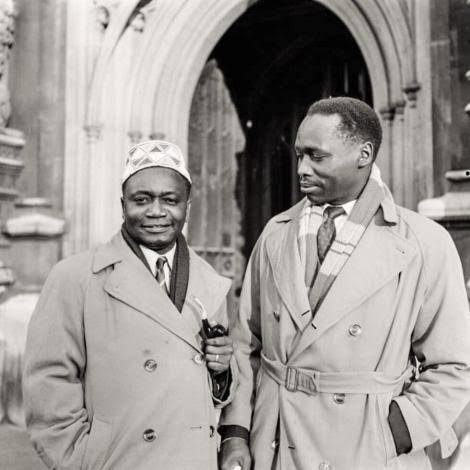
Ngala was appointed to the committee which drafted KANU’s constitution and at a meeting held on 14 May 1960, in Kiambu he was elected as the party’s treasurer in absentia which he declined having expected to be appointed the chairman. Daniel Moi also declined the assistant chairman slot. They later formed KADU.
On 12 November 1964 six key members of KADU crossed the floor to KANU. The leaders of KADU, including Ronald Ngala, Masinda Muliro and Daniel Arap Moi decided to dissolve KADU and join KANU.
“when, we must be prepared to sacrifice our political dignity for the peace and harmony of Kenya. I have decided to take the Democratic Union into the Government to strengthen the national front and speak with one voice, all issues that confront our nation.” Ngala on the decision to join KANU as quoted by the NewYork Times.
Ronald Ngala was made Minister of Cooperatives and Social Services in the Kenyatta government.
He also served as minister for transport and communication.
He went on to become one of KANU’s vice-presidents at the 1966 Limuru Conference in which Odinga Odinga was ejected from KANU.
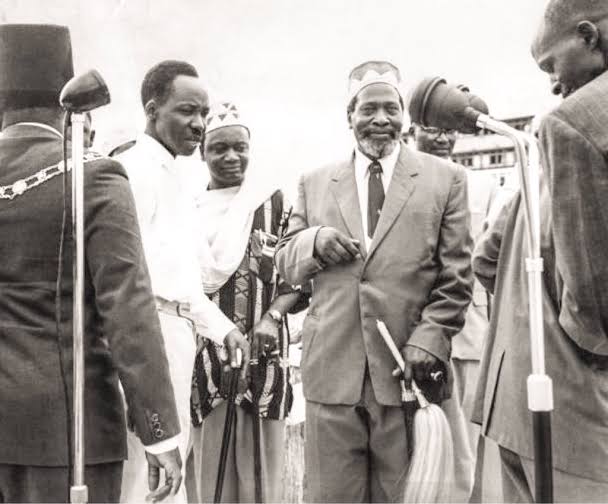
Mystery Surrounding His Death
The former kilifi South MP remained active in the government until he died in a road accident in 1972.The circumstances of Ngala’s death in 1972 were suspicious, but nobody was arrested or charged, and there was no inquiry.
An official government report claimed the accident was caused by a swarm of bees that attacked his car.
His driver survived the accident without injury.
Before her death in 2020, Ngala’ wife Esther Ngala disputed the State’s version of his death, insisting that he was a victim of a dark conspiracy.
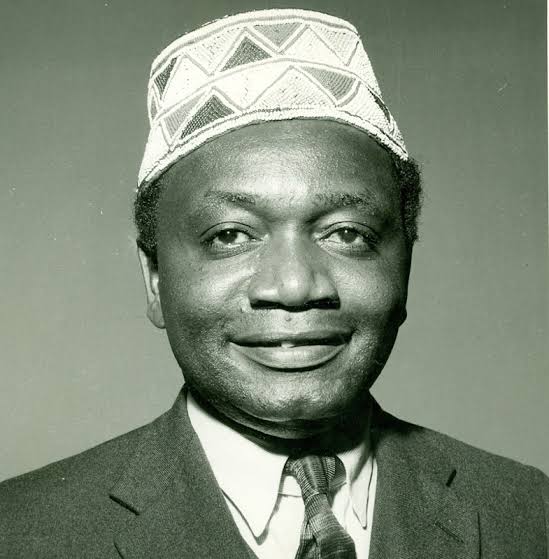
Ronald Ngala’s Legacy.
Mr. Ngala led the African delegation to the Constitutional Conference in London in 1960. In 1961 he became Leader of Government Business, the highest political office an African could hold in the country at the time.
In 1962, as Chief Minister in the minority Government formed by the Democratic Union, he represented his party at the London conference that resulted in a new constitution and independence.
Some historians have described him as the the country’s first prime minister on account that he became the country’s chief minister in 1962.
“The facts of history are known but there is always a tendency to sweep them under the carpet to deny him due credit,” said his eldest son and former long-serving Cabinet minister Noah Katana Ngala during a interview with the Standard newspaper.
During his KADU days he is credited for defending the interests of Kenya’s minority tribes, fostering the concept of regionalism, to make Kenya a federation of seven regions, giving minority tribes some political parity with the majority. His majimboism’ concept is said to be a precursor of modern-day devolution.
A career teacher, he is also credited for initiating various reforms in the education sector, advocating for a system that would best suite the African child as Kenya gained independence.
Additional information sourced from the UoN Repository, The New York Times.
Want to send us a story? Contact Shahidi News Tel: +254115512797 (Mobile & WhatsApp)


